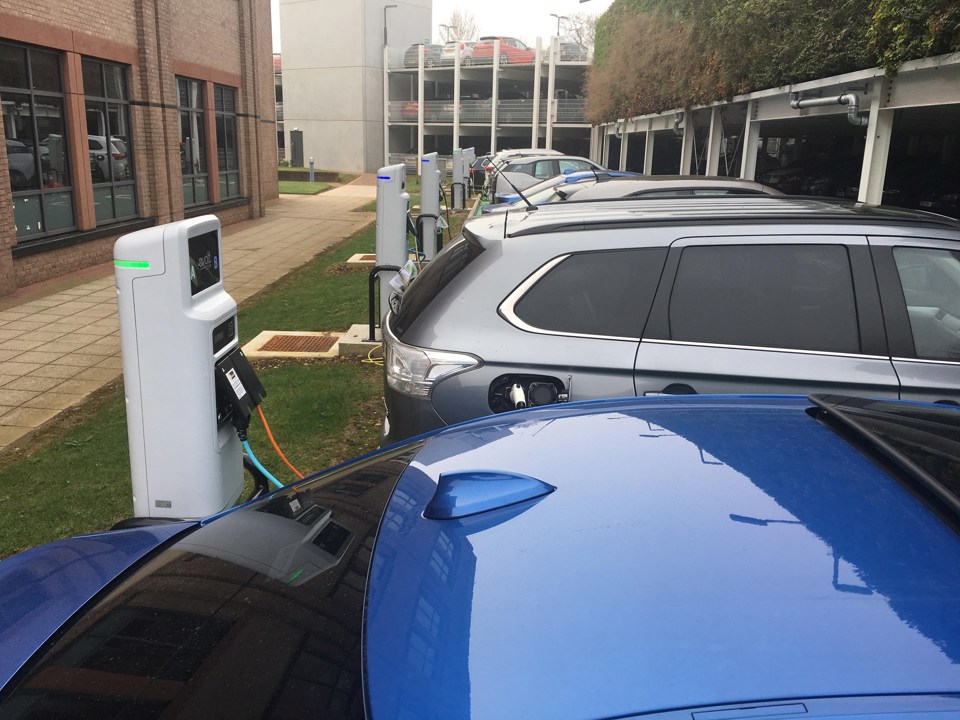Business owners can have a significant impact on the number of drivers converting to electric vehicles (EVs) by simply giving employees access to charge points at work, according to eVolt and the National Grid.
The latest data from National Grid House, the Warwick-based operational HQ of National Grid, shows a 334% uplift in the use of its charge points, which were installed as a viability project in April 2016. Employees now have access to six user-friendly 7kW dual outlet charging stations from eVolt UK, charge point supplier and eMobility brand of the SWARCO Group.
The data also demonstrates a near doubling of Plug-in Hybrid EVs (PHEVs) in the company car fleet since the chargers were installed.
Darren Watson, environmental operations advisor for National Grid’s sustainability and climate change team, said: “Since the eVolt charging infrastructure was installed, the number of company car PHEVs has risen from 177 to 375, and we have seen an increase in the number of fully electric vehicles.
“The chargers’ take up has been rapid and exponential, and we are forecasting further rises as the business continues to support the adoption of EVs, and our employees continue to select them as a credible alternative to traditional petrol or diesel engines.”
This installation of eVolt charge points is in line with National Grids’ Our Contribution scheme, an environmental sustainability strategy that focuses on the business’ climate commitment, responsible resource use, and care for the natural environment.
The success of this project is enabling National Grid to look at the viability of installing charge points at other, office-based, sites.
Richard Lloyd, risk and compliance manager at National Grid added: “We have found our eVolt chargers to be highly reliable and supportive of our eco-ambitions and have no reason to doubt installation at further sites would be a success.
“We are working collectively with eVolt to develop a strategy in realising this aim while continuing to increase use of the charge points at National Grid House,” Richard adds. “The more remote sites with fewer employees have individual challenges, and EV charging services must be provided in a sustainable way, so collaborating to find the best solutions is key.”
Justin Meyer, general manager of eVolt UK, continued: “The figures show what we consistently see after a business installs charge points; the considerable increase in their use alongside the increasing take up of EVs being used by employees.
“One of the key factors holding back EV sales is drivers’ worry that they will run out of battery power – what the industry calls range anxiety,” he continues. “But with charge points installed at working locations, drivers have convenient charging that fits with their normal driving routine.”
The installation of EV charge points at National Grid House was a collaboration between the Sustainability and Climate Change team (that proposed the chargers), its Commercial Property team (that provided the funding), and eVolt (the selected third-party charge point supplier).
Six eVolt units cover 12 parking bays and are able to fully charge two EVs simultaneously in around 3 to 4 hours. Three stakeholder groups use the charge points: company car drivers; privately-owned EV drivers; and salary sacrifice (on a lease/hire scheme) drivers.


















Sage & Onion - 23/03/2017 15:05
Have HMRC officially made any statement yet about how they will treat electricity provided by the workplace as a vehicle fuel? I read a Budget briefing note recently that said that workplace provided electricity is disregarded because its not petrol or diesel and so isn't regarded as a fuel. Anyone know?